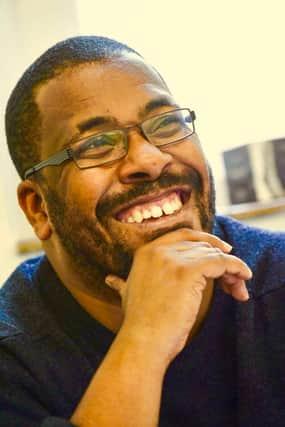"People often ask me whether I’m a ‘black writer’" - Roy Williams on his new play History


Roy Williams is not very old; he was born in London in 1968, and grew up in Notting Dale, the area now most familiar as the neighbourhood of Grenfell Tower. Yet there came a time, quite recently, when he realised that his experience of growing up black in London in the early 1980s was now as distant from today’s teenagers as the Second World War was from him, when he left school in 1984; and he felt the need to try to capture that feeling, and that sense of perspective, in a new play for this moment.
The result is the latest Sound Stage audio play History, set to be broadcast this weekend by its two co-producing theatres, Pitlochry Festival Theatre and the Lyceum in Edinburgh, in collaboration with audio company Naked Productions. Described as “a kaleidoscopic portrait of Black Britain over the last 40 years”, History offers us a series of monologues, and occasional dialogues, which link the experience of the 1980s to the present day through a group of characters, all of whom are part of the same extended family.
Advertisement
Hide AdAt the centre of the story is Neil, an intelligent and charismatic black teenager whose life spins off the rails, in the 1980s, when some of his mates decide to rob and beat up the Asian shopkeeper for whom he is working. He becomes a victim of brutal police violence, is condemned to a long prison sentence; and he leaves behind his pregnant girlfriend, Kelle, who eventually marries, Gary, a black Young Conservative dedicated to making himself more British than the British.
Around these three central characters spin their children, brothers and sisters, including Neil and Kelle’s gay son Jordan, brought up by Gary as his own. Each voice we hear embodies its own struggle with the stresses of being black and British, in a society where – for all our fine words – racial fear and hatred often still explode into violence; and the play ends in a long, intense dialogue between Neil and his daughter Claire about how to respond – with despair, or renewed struggle – to the events of 2020, including the death of George Floyd.
“Which of these characters am I?” says Roy Williams, from his home in London. “I really think I am all of them; it’s very much as if they all came from deep within me, when I began to think about this play. At first, they presented themselves as a range of different voices, and I began to write them out in monologue. But then I suddenly realised they were a family – very different, sometimes distant, but connected. I just wanted all of their voices to be heard, very clearly; and I knew that between them, they could tell something of this story, and how it has evolved since the 1980s.”
There are certainly some clear links between Williams and his central character Neil; they both left school in the early 80s, amid the same uncertainty – in Margaret Thatcher’s Britain – about how they were going to earn a living. The difference, though, is that Williams – who had always loved and excelled at English at school – knew with great clarity that he wanted to be a writer, despite a careers advisor telling him flatly that his ambitions were “not very realistic”, and no-one ever suggesting that he might go on to higher education. “It wasn’t,” says Williams, “that kind of school.”
Williams continued to love books and theatre, though; and in his early 20s, feeling increasingly bored with his job as an usher in a West End theatre, he noticed an advertisement for a three-year theatre writing course at Rose Bruford College, and won a place on it. He began to write plays from that moment, in 1990; and by the mid-1990s, he had begun to win the first of many awards. His list of more than two dozen plays produced over the last 25 years includes classics of modern British drama about race and identity such as Sing Yer Heart Out For The Lads! (2002), and his acclaimed 2020 twin monologues Death of England and Death of England: Delroy, both produced at the National Theatre.
History, though, will be Williams’s first ever professional production in Scottish theatre. Ben Occhipinti’s beautiful audio staging features mighty black British actor Cyril Nri as Neil, and Scottish actress Saskia Ashdown as Kelle; as well as a superb reggae-based score by Darren J Benjamin. And for Williams, it comes at a time when he feels poised between hope and despair, about the future direction of the story told in History.
Advertisement
Hide Ad“I am less hopeful than I was,” says Williams. “I think the last five or six years have deflated me. Perhaps we on the left, or the centre left, had become complacent; we thought we had won some of these arguments, and didn’t realise how much could be lost, very quickly.
“But the worldwide response to the death of George Floyd gives me some hope; I don’t think we’ve seen anything quite like that before, with so many young people involved. People often ask me whether I’m a ‘black writer’ or just a writer, but I think it’s obvious that I’m both. Like every writer, I have my own stories to tell. Mine are inevitably shaped by the experience of being black and British, over the last 50 years; and I have no problem in embracing that, now or in the future.”
Advertisement
Hide AdHistory can be heard from 24-26 September, at either https://booking.pitlochryfestivaltheatre.com/events/ or https://lyceum.org.uk/whats-on/production/a-roy-williams-soundstage-premiere
A message from the Editor
Thank you for reading this article. We're more reliant on your support than ever as the shift in consumer habits brought about by coronavirus impacts our advertisers
If you haven't already, please consider supporting our trusted, fact-checked journalism by taking out a digital subscription at https://www.scotsman.com/subscriptions